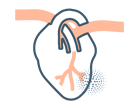Baumgartner, H., & De Backer, J. (2020). The ESC Clinical Practice Guidelines for the Management of Adult Congenital Heart Disease 2020. European Heart Journal, 41(43), 4153-4154. doi: 10.1093/eurheartj/ehaa701
What are Congenital Heart Defects? | CDC. (2021). Retrieved 18 February 2021, from https://www.cdc.gov/ncbddd/heartdefects/facts.html
Sun, R., Liu, M., Lu, L., Zheng, Y., & Zhang, P. (2015). Congenital Heart Disease: Causes, Diagnosis, Symptoms, and Treatments. Cell biochemistry and biophysics, 72(3), 857–860. https://doi.org/10.1007/s12013-015-0551-6
Williams, K., Carson, J., & Lo, C. (2019). Genetics of Congenital Heart Disease. Biomolecules, 9(12), 879. https://doi.org/10.3390/biom9120879
Saliba, A., Figueiredo, A., Baroneza, J., Afiune, J., Pic-Taylor, A., Oliveira, S., & Mazzeu, J. (2020). Genetic and genomics in congenital heart disease: a clinical review. Jornal De Pediatria, 96(3), 279-288. doi: 10.1016/j.jped.2019.07.004
Linglart, L., & Gelb, B. D. (2020). Congenital heart defects in Noonan syndrome: Diagnosis, management, and treatment. American journal of medical genetics. Part C, Seminars in medical genetics, 184(1), 73–80. https://doi.org/10.1002/ajmg.c.31765
Calcagni, G., Unolt, M., Digilio, M. C., Baban, A., Versacci, P., Tartaglia, M., Baldini, A., & Marino, B. (2017). Congenital heart disease and genetic syndromes: new insights into molecular mechanisms. Expert review of molecular diagnostics, 17(9), 861–870. https://doi.org/10.1080/14737159.2017.1360766
Hopkins, M. K., Dugoff, L., & Kuller, J. A. (2019). Congenital Heart Disease: Prenatal Diagnosis and Genetic Associations. Obstetrical & gynecological survey, 74(8), 497–503. https://doi.org/10.1097/OGX.0000000000000702






